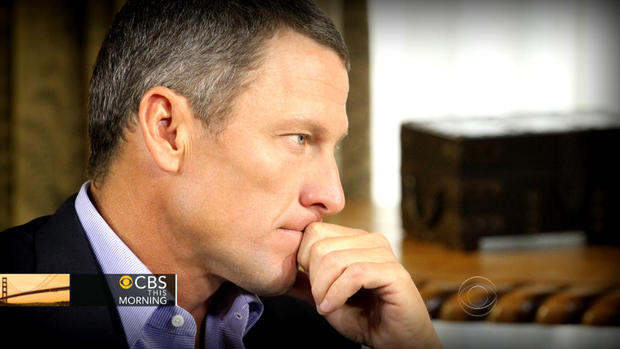Tour de France would vacate seven titles if UCI strips Lance Armstrong
PARIS The Tour de France will have no official winner for the seven races from 1999-2005 if Lance Armstrong is stripped of his victories by the International Cycling Union.
In an interview with The Associated Press on Friday, Tour director Christian Prudhomme called the U.S. Anti-Doping Agency's report on Armstrong "damning." It raises doubts, he said, about "a system and an era."
Tour officials are still waiting on the UCI's decision on whether to go along with USADA's decision to ban Armstrong for life and erase his racing results. A spokesman for the sport's governing body, Enrico Carpani, said it was "too early to say" what would happen. The UCI must decide by the end of the month whether to appeal USADA's ruling.
- USADA: Armstrong "ruthlessly" required teammates to dope
- 11 teammates testified against Lance Armstrong, USADA says
- 60 Minutes Overtime: USADA report slams Lance Armstrong
UCI President Pat McQuaid declined to comment on USADA's report but defended his organization's efforts to catch drug cheats.
The report cost Armstrong's former team manager, Johan Bruyneel, his job as general manager of RadioShack Nissan Trek. The team said Friday the decision was taken by "mutual agreement" and that Bruyneel "can no longer direct the team in an efficient and comfortable way."
The Belgian has his own legal battle with USADA and has opted for arbitration to fight charges that he led doping programs for Armstrong's teams.
If Armstrong's Tour victories are not awarded to other riders, that would leave a gaping seven-year black hole in Tour de France record books. It would also mark a shift in how Tour organizers treated similar cases in the past.
When Alberto Contador was stripped of his 2010 Tour victory for a doping violation, organizers held a ceremony to award the race winner's yellow jersey to Luxembourg's Andy Schleck. In 2006, Oscar Pereiro was awarded the victory and a place in the record books after the doping disqualification of American rider Floyd Landis.
Prudhomme wouldn't address the differences in approach.
McQuaid said inadequacies in the anti-doping system were failing to catch drug-using athletes. The UCI tests athletes repeatedly for doping, he said, but the federation can do little if the results are negative. He insisted the anti-doping system had improved since the 1998-2009 period of Armstrong's career examined in the report.
For Frankie Andreu, the report offered relief. A former Armstrong teammate, he had previously admitted doping.
"We're kind of getting to the end of this, where we can have some closure on this," Andreu said. "There's more riders, more people out there, talking about what happened in the past."
The cyclists Armstrong beat to win his seven Tour de France victories include men who have faced a tangle of doping bans and accusations.
Here's a look at who else was on the podium in the seven Tours that Armstrong won from 1999-2005:
1999
No. 2 : Alex Zulle, Switzerland. His 1998 team, Festina, was ousted from the Tour that year in connection with the widespread use of the performance-enhancing drug EPO. Zulle later admitted to using the blood-booster over the four previous years. The Festina affair nearly derailed the 1998 Tour, and is widely seen as the first big doping scandal to jolt cycling.
No. 3: Fernando Escartin, Spain.
2000
No 2: Jan Ullrich, Germany. The 1997 Tour winner, a five-time Tour runner-up and longtime Armstrong rival. He was the top-name cyclist among at least 50 implicated in the "Operation Puerto" police investigation in Spain in May 2006. Ullrich was stripped of his third-place finish from the 2005 Tour and retired from racing two years later. Earlier this year, he confirmed that he had had contact with Eufemiano Fuentes, a Spanish doctor at the center of that scandal, calling it a "big mistake" - but did not admit to doping.
No. 3: Joseba Beloki, Spain. Implicated in Operation Puerto, he retired in 2007. He was reportedly was cleared by a Spanish court of any involvement in the case.
2001
No 2: Ullrich.
No. 3: Beloki.
2002
No. 2: Beloki.
No. 3: Raimondas Rumsas, Lithuania. On the last day of the 2002 Tour, police stopped his wife, Edita, at the Italian border and searched her car, turning up suspected doping products. A French court later handed them four-month prison sentences on doping-related charges. The cyclist denied taking banned substances at that event, and all his tests came back negative. He said the products in his wife's car were for his mother-in-law. The next year, he was given a one-year ban after testing positive for EPO in the 2003 Giro d'Italia.
2003
No. 2: Ullrich.
No. 3: Alexandre Vinokourov, Kazakhstan. He later served a two-year doping suspension after twice testing positive for banned blood transfusions during the 2007 race. He won the Olympic road race in London last month and has announced plans to retire.
2004
No. 2: Andreas Kloeden, Germany.
No. 3: Ivan Basso, Italy. Excluded from the 2006 Tour because of his involvement in Operation Puerto. He claimed that he gave his blood to Fuentes - the Spanish doctor at the center of that scandal - but never used it. Later that year, Basso received a two-year doping ban; he later returned, and won his second Giro d'Italia in 2010.
2005
No. 2: Basso.
No. 3: Ullrich.
